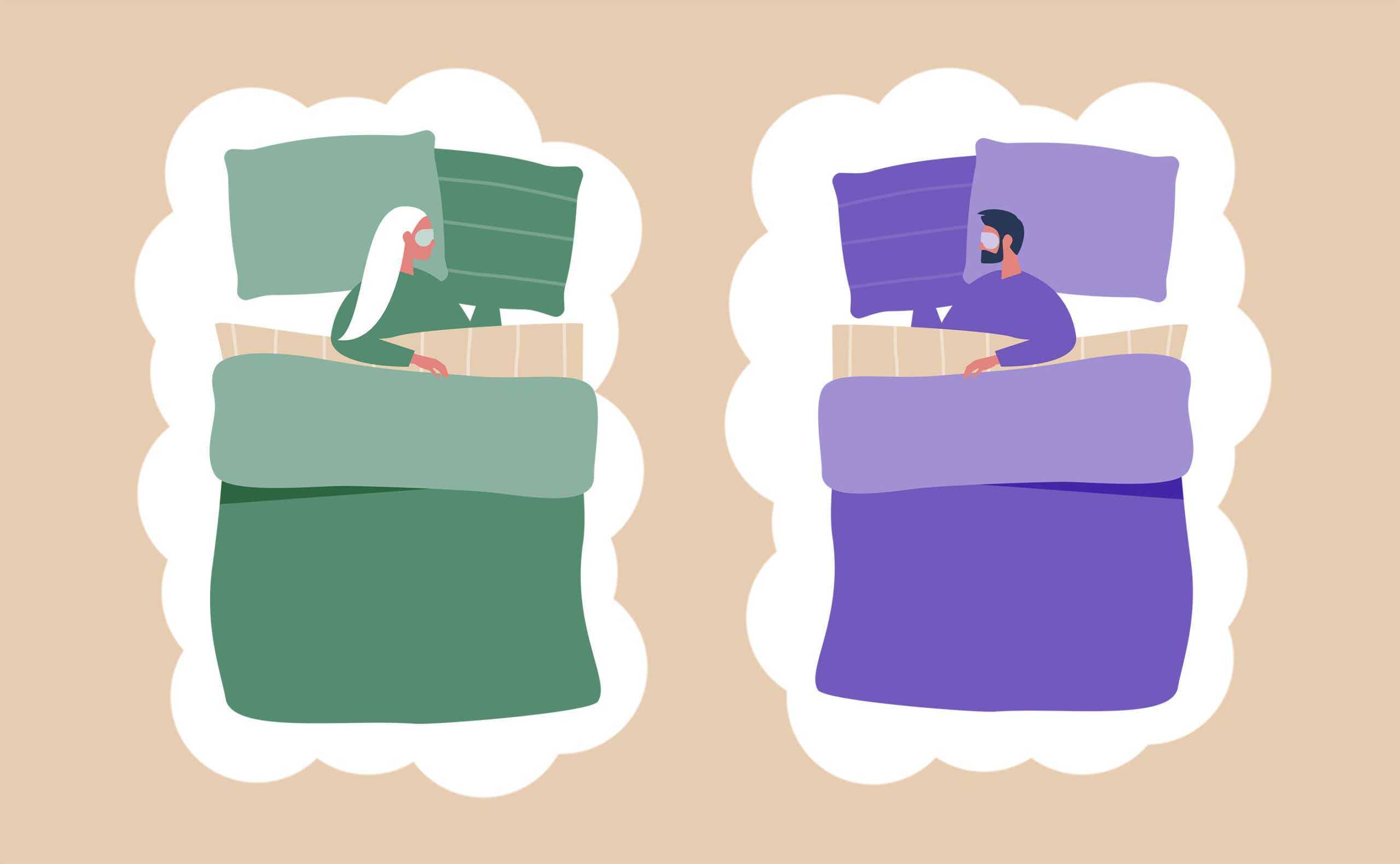Does your partner snore? Toss and turn? Hog the covers? Well, if that’s keeping you from getting a good night’s rest, maybe it’s time to consider sleeping apart.
More and more, couples seem to be entertaining the idea, Wendy Troxel, Ph.D., a sleep researcher and the author of Sharing the Covers, told Katie Couric Media in 2022. She pointed to a survey by the National Association of Home Builders, which found that the preference for dual master bedrooms rose from 25 percent of prospective buyers in 2003 to 40 percent in 2018.
What are the benefits of sleeping separately?
Research has shown that we do actually sleep better alone, Dr. Troxel said. (Especially if you’re sharing a bed with someone who snores.) Most of these studies measure how much participants move when sleeping alone versus sleeping with their partners, and have found that people toss and turn less when they don’t have to share a bed.
But most of us still choose to sleep alongside the person we love. That may be because we prioritize cuddling or enjoy that feeling of closeness and security that can come with sleeping alongside a significant other, even if it means sacrificing a quality eight hours of rest. But some of it may have to do with the stigma that’s still attached to sleeping apart (as evidenced by the term “sleep divorce,” said Dr. Troxel, who prefers the phrase “sleep alliance.”) This idea that separate beds are some sort of death knell, the precursor to divorce or a sign of a sexless marriage, may be keeping couples that would benefit from a different sleeping arrangement from giving it a shot.
“There’s a fear around it,” said sex counselor Eric Marlowe Garrison. “People are afraid to think about how it could impact their partner or what their friends, parents, or priest may think.”
But the potential advantages of a “sleep divorce” extend beyond just better sleep, Dr. Troxel said. It could also help you strengthen your relationship.
“The quality of our sleep can affect the quality of our relationships and vice versa,” she said.
Her research has found that when sleep is compromised people are (predictably) more irritable, more likely to engage in conflict, and more likely to lash out at a partner. “Over time, sleep deprivation or poor sleep quality can really tip the scales toward these unhealthy, toxic relationship behaviors,” she said.
On the other hand, conflict in a relationship can lead to sleepless nights. One of her studies shows that when a woman isn’t happy with her relationship, that night both her sleep and her partner’s sleep suffer. “It can create this vicious cycle,” Dr. Troxel said. “But you can turn that around and make it a positive feedback loop by prioritizing sleep.”
What should you know before getting a sleep divorce?
It’s a lot more common than you think. Chances are someone you know either practices it themselves or wants to, said Garrison, who told us in 2022 that he sleeps separately from his partner. He runs group counseling sessions and is always amused by how many people timidly broach the subject only to be met with intense curiosity from other members in the meeting. “It’s like this secret sin,” he said, adding that clients feel much more reluctant to talk about it than even a bedroom kink.
And, paradoxically, it may invigorate your sex life. Many couples fear that by sleeping apart, they’ll end up missing out on some kind of “spontaneous” intimacy, Dr. Troxel said. But in most long-term partnerships, couples are juggling work, kids, and myriad other obligations, so sex “often has to be planned anyway,” she said. Being intentional and carving out time to be together can be very romantic.
“It can be like a lovely reunion,” she said.
But even if sex isn’t involved, both Garrison and Dr. Troxel recommended couples spend some time together in bed, either before falling asleep or upon awakening. The bedroom can still act as a sanctum for partners who sleep apart, where bonds are strengthened, Dr. Troxel said.
The other point underscored by both experts is that when it comes to couples’ sleeping arrangements, there’s no one-size-fits-all approach. There are couples who have happily slept in the same bed for 50 years. And there are couples who sleep in different rooms during the weekday and together on the weekends, or who cycle through periods of sleeping apart because of sleep apnea or conflicting work schedules or whatever else.
“Sleep is vitally important for the health of our relationships and sleeping together may not work for every couple,” Dr. Troxel said. “It’s really OK to find sleeping solutions that are going to work best for that individual couple.”









